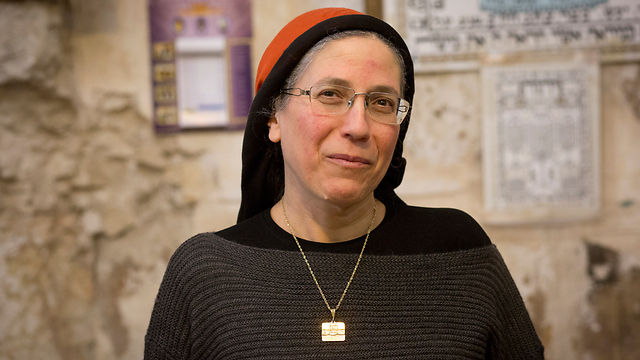
The radical rabbis pulling Uri Ariel's strings
Op-ed: Construction minister's religious leaders chose to secure their place in the Knesset, perhaps even in the government, with the votes of people who don't share their views.
It won't work, party officials clarified. You have to wear a skullcap every time you leave the house. Not because it's a command from God, but because the public won't understand. They'll think you've become heretical, that you're not one of us.
Burg obeyed, of course. Since then, he never removed the skullcap from his head.
The skullcap is a sort of identity card. It provides a common denominator for the entire sector, yet creatively reflects the split within it.
The latest issue of Deot, the magazine of religious-Zionist movement Ne'emanei Torah Va'Avodah, features drawings by graphic designer Moshe Kakon, which illustrate the skullcap doctrine in graphic measures.
Kakon examined the skullcaps according to the length of their radius. He found 16 different types of skullcaps, from the tiny transparent and micro skullcaps to the huge Breslov and Saado skullcaps. Each size, each color and each type of material have their own ideology and political statements.
In another illustration he described the skullcap's position on the Zionist-religious head – each position and the message it conveys (a large skullcap in the middle says I am religious, make no mistake about it; a skullcap on the side says I put it on because I have to; a skullcap covering the entire head says brother, I am righteous, etc).
Construction Minister Uri Ariel makes sure to dress according to the latest fashion of the Mercaz Harav Yeshiva: A large knitted skullcap, pale blue in its center and white on the sides. It joins the accessories of the founding generation of Gush Emunim settlers' movement: A checkered shirt over the trousers and biblical sandals underneath.
The message is: I am religious, but one of the guys; I am a minister, but modest and simple. I don’t want anything for myself. It's all for you, for the people of Israel.
His apperance is deceiving. Behind it stands the messenger of the sector's most radical rabbis, the rabbis of Yigal Amir and the "price tag" youth and Lehava organization, rabbis whose preaching is infected with racist expressions and whose demands in the religious area are closer to the most radical streams in the ultra-Orthodox sector.

Ariel heads a tiny party called Tkuma, which is one of the components of the Bayit Yehudi party. Tkuma, like the haredi Shas and United Torah Judaism parties, and unlike the National Religious Party it teamed up with, obeys its rabbis. Whatever they rule is sacred.
The rabbis have been sitting in the past few days, day and night, discussing the party's fate: Should it stay in Bayit Yehudi despite the humiliating arrangement Naftali Bennett is offering it, or should it join Eli Yishai, despite the humiliating agreement waiting in the new party?
The agreement Bennett offered freezes Tkuma's representation in Bayit Yehudi. If the Knesset list grows, as one would assume, Tkuma will not grow with it. The humiliating element in the agreement offered by Yishai is that Knesset Member Orit Strock will not be included in the joint list. Why? Because she is a woman. Yishai's rabbis oppose the election of women.
Ariel and his rabbis eventually chose humiliation with security over humiliation with a gamble: They will go with Bennett and make in into the Knesset, and perhaps even into the government, with the votes of people who share neither Ariel's nor Strock' views.
Yishai will not be left alone. Tkuma's rabbis will make sure to include one of their people on his list.
The previous elections revealed a fascinating phenomenon in the polls stationed in religious settlements: Hundreds of the residents joined the Likud and voted in the party's primary elections, but only few voted for the Likud in the Knesset elections. Their votes went to Bayit Yehudi.
In the upcoming elections, this phenomenon may grow: Members registered in the Likud and members affiliated with Bayit Yehudi will skip both parties on Election Day and vote for Eli Yishai's list.
In their defense, it should be noted that they did not invent this phenomenon: For years now, thousands of Israeli Arabs have been registering for one party, Labor for example, and abandoning it on Election Day.
With the Arabs, this is a case of personal and clan corruption. With the, Jews it's a case of political corruption. I don’t know which is more irritating. Both cases are irritating. I do know which is more dangerous.










